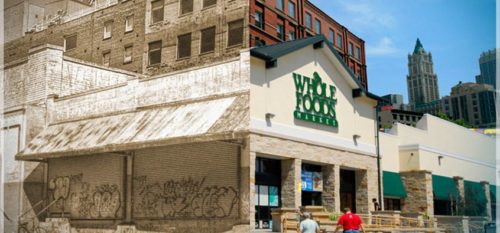There Goes the Neighborhood: How Food Helps Drive Gentrification
Share
Explore Our Galleries
Breaking News!
Today's news and culture by Black and other reporters in the Black and mainstream media.
Ways to Support ABHM?
By Terrell Jermaine Starr, The Root

Lezli Levene Harvell at Iconoclast Dinner Experience (Lezli Levene Harvell
Photo: Ray A. Llanos)
Lezli Levene Harvell has enjoyed food all of her life. The festivals, invitations to private food events and the scene, in general, fascinated her. However, she also noticed a dearth of black people being celebrated in the culinary world and wanted to do something about it. A pediatric dentist by training, Levene Harvell started the Iconoclast Dinner Experience in 2015 to celebrate people of color in the food world.
The events take place annually in New York City, Chicago and Atlanta with the goal of expanding the conversation around food and the culinary arts beyond the traditional white male construct. Food prepared by top chefs of color is served at the events, including sit-down dinners or cocktail parties, and the conversations that follow often deal with issues revolving around race and equality in the field.
Take the Whole Foods that opened in what is traditionally considered a historically low-income neighborhood, for example. Who is that market really for? Can the residents in that community afford it? Is that Whole Foods a gateway for white people to feel that the neighborhood’s culture is being redesigned to accommodate them? And what about new restaurants that open up? Do the owners consider what their presence means for the locals? Do they even care?…

Whole Foods in Harlem.(AP/Christopher Penler via Shutterstock/Salon/Benjamin Wheelock)
The discussion of how gentrification affects neighborhoods has been so fixated on housing that little attention has been devoted to how food has the same power. The Root’s Angela Helm wrote about the impact that the aforementioned Whole Foods has had on her native Harlem, noting how its black residents are leaving because of rising rents and higher costs of living. As excited as she was about the offerings that Whole Foods provides, she said that she would give it up in a heartbeat for the old charms that existed before white people found the neighborhood appealing….
And that is the point: to understand how inequality is bigger than housing, politics, gender and other more commonly discussed areas of discrimination. Inequality impacts what reaches your palate, too.
Read the full article here.
Read more Breaking News here.
Read more about the Iconoclast Dinner Experience here.
View more American Black Holocaust Museum galleries here.









Comments Are Welcome
Note: We moderate submissions in order to create a space for meaningful dialogue, a space where museum visitors – adults and youth –– can exchange informed, thoughtful, and relevant comments that add value to our exhibits.
Racial slurs, personal attacks, obscenity, profanity, and SHOUTING do not meet the above standard. Such comments are posted in the exhibit Hateful Speech. Commercial promotions, impersonations, and incoherent comments likewise fail to meet our goals, so will not be posted. Submissions longer than 120 words will be shortened.
See our full Comments Policy here.